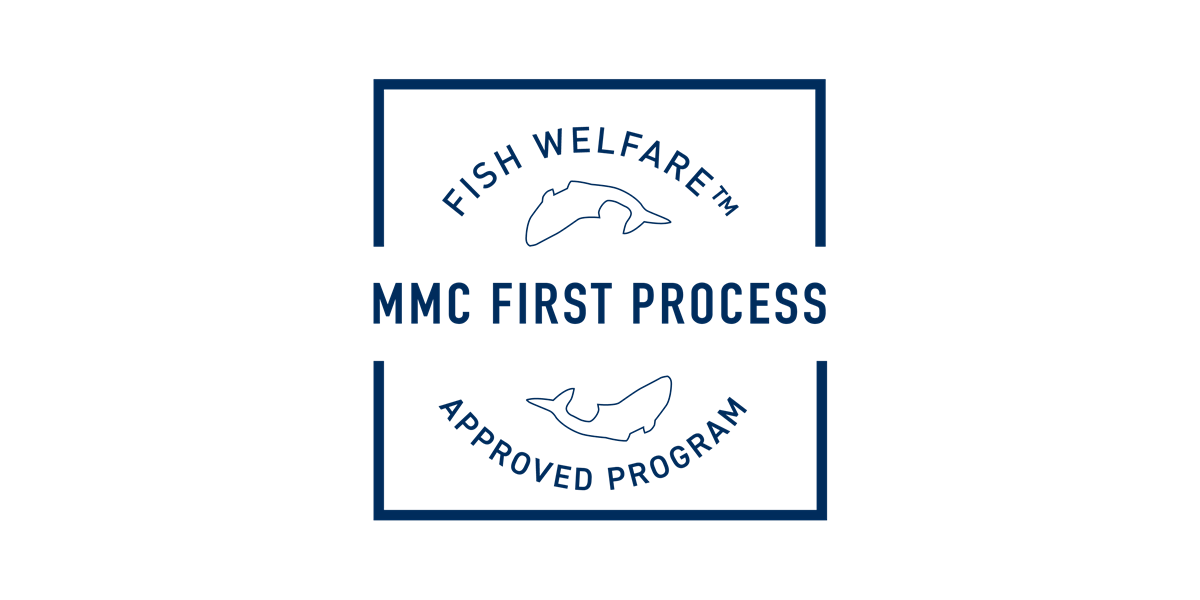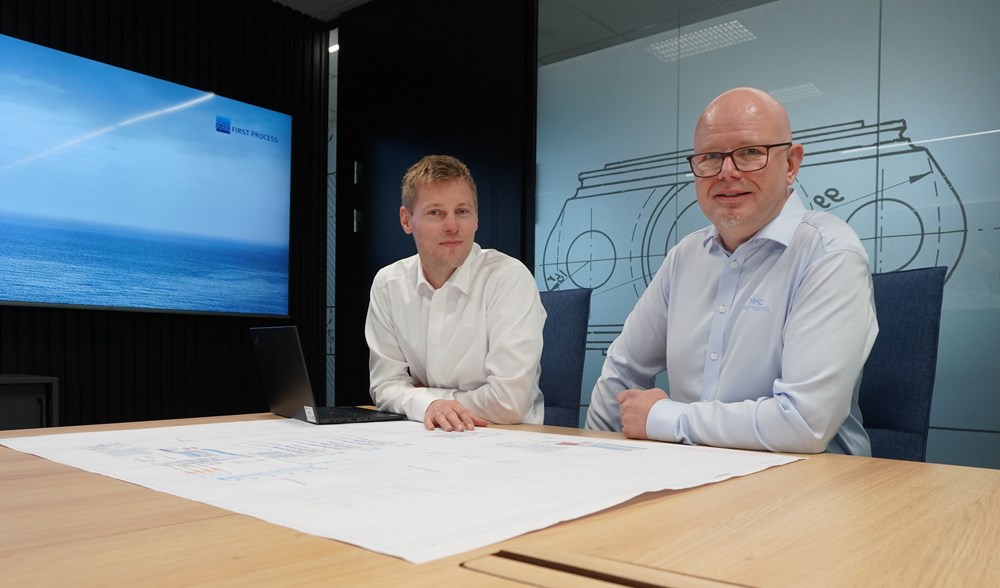
Fish welfare is about showing respect for the fish, sustainable management of common resources and optimal quality.
At MMC First Process, we develop systems that ensure biomass security, and solutions for gentle and safe handling of fish. ‘Fish welfare-approved program’ means that the quality is assured and that the fish have been treated well. We are looking forward to telling you more about this concept going forward.
Read more about sustainable fish handling.
Fish welfare is about making the right ethical and moral choices. Taking good care of the fish adds value, not only improving the quality of the raw material but also maximizing the use of the biomass.
We all want the fish to have a good life. MMC First Process develops handling systems for live fish that help to ensure their welfare. Our transparent and well-documented approach demonstrates our commitment to fish welfare as a top priority. Our fish-handling equipment and processes that are designed, manufactured and utilized under this premise.
Protecting fish welfare during handling
The key is to ensure that as much of the handling as possible is carried out gently and in conditions that most resemble the natural habitat of the fish. The aim is to avoid stress and physical injury.
We believe that the keys to promoting fish welfare and biomass security are: Attitude and Investment. The payback comes through satisfied customers, better growth and utilization of the biomass and superior quality of the products. In this way, our sustainability and ethical commitments are implemented profitably.
Large fish need to be treated differently from small fish
Traditionally, land-based installations have for the most part only been used for hatching and rearing smolts. When fish are also reared to their adult size ashore completely different forms of fish handling are required.
MMC First Process’s solutions are based on years of development and collaboration with leading well-boat companies. We have successfully learned how to transport large, live fish gently. Innovations such as RID Fish Pump, moveable bulkheads, gravity transfer and automated handling processes all help to achieve biomass security, good fish welfare and full utilization of the capacity in land-based fish farms.
Ambitious targets
Marine food resources will make an important contribution to feeding the world's growing population. MMC First Process aims to equip customers world-wide to succeed with land-based aquaculture.
Improved fish welfare increases both quality and profit. This is critical in aquaculture where fish health have great significance for the ability to reduce stress, bacteria, virus and parasites like sea lice. As a society, it is our social responsibility to fight mortality and reduce wastage in the industry of aqua culture.
Maintain fish welfare and the environment during handling and processing of fish.
To maintain optimal fish health, reduce stress and fight diseases, it is of utter importance to handle the fish gently. As a world leader in live fish handling, we have developed system solutions to handle fish in a sustainable and gentle way. We continuously work to promote good fish health, maintain fish welfare and safeguard the environment when developing our products and solutions for handling and transportation of live fish.
Fish welfare = sustainable fish handling
Modern wellboats transports and handles huge amounts of fish and values. Handling and transporting biomass in a safe and sustainable manner is crucial both for our customers and the environment. It is our social responsibility to contribute with good and safe solutions for our customers and the generations to come.
Transportation and pumping of fish will always involve a certain amount of risk. Factors such as water quality, temperature and cleaning, combined with fish density and pump distance, is crucial for fish welfare. For this reason we have developed a series of patented solutions like the Rid Fish Pump and Fish Tank System, to safeguard fish welfare and minimize risk for our customers.
Fish Welfare and MMC First Process.
Our care for our customers, fish welfare and the environment is always our highest priority. We work constantly to improve our sustainable fish handling solutions that improve fish welfare and maintain the environment. We work together with our customers to make the best possible solutions for every need.
Our experienced engineers collaborates with the production department to lead the development of quality assured system and solutions that has long durability, safeguards biosecurity and promotes good fish health.
MMC First Process have in collaboration with the Norwegian authorities, developed innovative solutions to increase fish welfare. Our solutions has contributed to the change of the seafood industry by increasing sustainability and protecting the environment.
Innovation and creativity have been at the core of our business since we started. In a high-tempo industry and a business that offers multiple opportunities and challenges, we have established a separate, dedicated interdisciplinary R&D department. This is an important structural initiative to enable us to take the next big steps forward.

"From the start of an R&D project through to its completion, we continuously review our goals and ambitions for fish welfare and biomass security," says Eivind Vinje, VP R&D. “We set the bar high as we seek to live up to our own and our customers’ social responsibilities. We create traceability and transparency by using data and digitalization in our solutions. This enables us to discuss facts and identify areas of improvement.
Our design thinking also involves being able to deliver sustainable solutions, where future improvements are retrospectively compatible as far as possible. The whole solution must then be resilient enough to last throughout the full life cycle of the supported system and its surroundings. This requires high-quality engineering and good material choices, as well as defensible ethical and moral choices throughout the process. Every new R&D project has to be authorised by management, and the sales and technical departments, before it starts. This thorough process helps us to ensure that the products and services we develop for the future provide value for our customers, take care of the fish and have the minimum environmental impact for future generations.
We have significantly strengthened our R&D department to take advantage of an interdisciplinary team. Our customers are demanding more sustainable and transparent solutions and with our passion for technology we aim to be ahead of the curve,” concludes, Vinje.
Making sustainability profitable
One of the systems we in MMC First Process have worked hard at in recent years is a pump that moves fish gently and with minimum energy use. This is a project where social and environmental responsibility have been prioritised throughout.
“First and foremost, this is about fish welfare and the quality of the end product,” says Roy Glomset, R&D Manager.
“Our main focus during the development of new products is always on fish welfare and sustainability and we use an independent third party to document this. This is why we have been working closely with Sintef Ocean and Møreforsking throughout this project.
We aim to help our customers to make fuller use of the raw material, by handling the fish as gently as possible throughout the pumping process. We therefore set ourselves the target of developing sustainable fish handling solutions for the seafood industry and saw clear potential for using this type of pump to transport live fish, if we could solve one or two problems along the way. We have been working on the system for several years and have supplied the RID Fish Welfare pump for use in many installations in the pelagic industry. We have gained invaluable knowledge, and this has helped us to develop the pump so that it can also handle large, live fish.
The pump is patented and unique in its kind. It has no impellers, valves or other obstructions that can damage the fish on their journey from A to B. The transition from vacuum to pressure is smooth.
In 2020 Møreforskning and Fylkesnes Fisk joined us for an experiment where we ran live salmon through the pump. To measure fish welfare, blood samples were taken from all the fish and analysed for lactate, which is an indicator of stress. We were again pleasantly surprised by the results, which showed how gentle the new pump is with the fish and how little stress it causes. In fact, the report shows that the stress level in the fish was well beneath the recommended threshold. This project shows that focus on fish welfare and sustainability creates real and measurable value for our customers through increased quality and biomass security,” says Glomset.